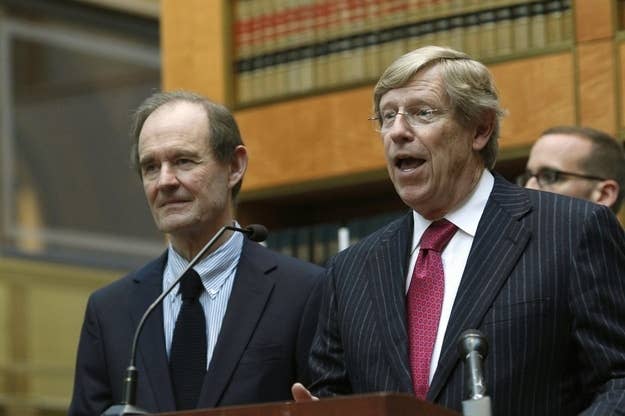
The case challenging the constitutionality of California's Proposition 8 is "an attractive vehicle" for determining "whether the States may discriminate against gay men and lesbians in the provision of marriage licenses" — but the Supreme Court should pass on the case, lawyers challenging the law say, and let stand an appeals court ruling that strikes down the 2008 amendment on narrow grounds.
If the Supreme Court takes the advice of Ted Olson, David Boies and the other lawyers representing the plaintiffs in Perry v. Brown, then Proposition 8 would remain unconstitutional, as the Ninth Circuit Court of Appeals held, and same-sex couples in California would regain the right to marry that they had been able to exercise briefly in 2008.
The proponents of the law asked the Supreme Court on July 31 to take the case and uphold the voter-initiated constitutional amendment that had the effect of reversing a California Supreme Court decision that allowed same-sex couples in the state to begin marrying under state law.
In the filing before the Supreme Court, Olson, who was President George W. Bush's top Supreme Court lawyer in the Department of Justice, is the counsel of record for the plaintiffs — meaning it is he who would be likely to make the case to the justices in oral argument should the court accept the case.
He and Boies, Al Gore's lawyer in the 2000 election recount litigation who opposed Olson at the Supreme Court, argue today that the lower court decision striking down Proposition 8 properly applied a 1996 Supreme Court case, Romer v. Evans, calling the Ninth Circuit's opinion a "straightforward application of settled Supreme Court precedent."
In the Romer case, the Supreme Court held that Colorado's voters unconstitutionally enacted an amendment that prohibited cities from passing nondiscrimination ordinances that would protect gay, lesbian and bisexual people from discrimination. Because the California Supreme Court had held that California's constitution required allowing same-sex couples to marry and then the people's vote in 2008 ended that, the Ninth Circuit held that Proposition 8 was similarly invalid.
The proponents argued to the Supreme Court that the Ninth Circuit had "fundamentally" misapplied the case, as well as another Supreme Court case addressing when states withdraw previously granted "state-law rights."
The filing today by the plaintiffs in the case was slightly unusual, as it suggested that the case was "an attractive vehicle for approaching—if not definitively resolving— th[e] issue" of whether states can restrict the right of same-sex couples to marry.
Nonetheless, the lawyers for the plaintiffs assert that Supreme Court's standards for when it takes a case "lead inexorably" to the conclusion that the court should not take the case. In addition to arguing that the appeals court properly applied the Romer decision, the plaintiffs argue that, even if it did not, there remain questions, raised previously, about whether the proponents of the law have legal standing to bring the appeal when the state defendants have not done so. Finally, they argue, there are additional reasons why the courts could strike down Proposition 8, including its claimed abridgment of the affected couples' right to marry.
The proponents, represented by Charles Cooper of Cooper & Kirk, will be able to present the Supreme Court with a response to today's filing, and the court will then consider once the justices return from their summer recess whether they will take the case in the coming term that begins in October.
